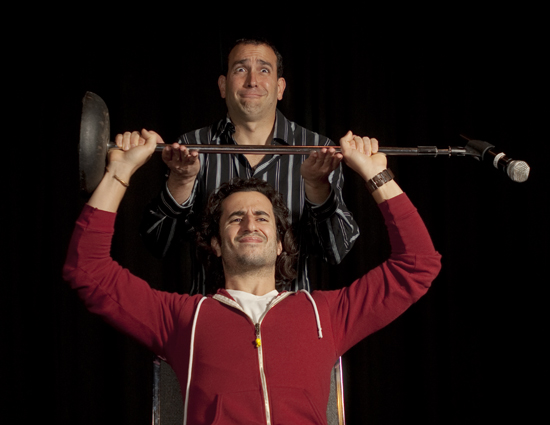These days, news headlines are often dominated by stories of conflict and unrest in the Middle East.
It is against this backdrop that six campus organizations: Bruins for Israel, Students for Justice in Palestine, Middle East Peace Coalition, United Arab Society, Lebanese Social Club and the Student Committee for the Arts, have come together to promote unity and understanding through The Middle Eastern Comedy Festival of Los Angeles at UCLA tonight at the Northwest Auditorium. This event is momentous in the fact that it marks the first instance in which many of these organizations are collaborating.
“Bruins for Israel and Students for Justice in Palestine have never had both their names on the same event,” said Lauren Rosenthal, a fourth-year English student and president of Bruins for Israel. “To have that at all is a success.”
The apolitical show will feature a series of comedians and actors of Jewish, Arab and Persian descent who will use humor to dispel the many stereotypes about the Middle East.
“The comedians are hilarious,” said Lubna Hindi, a third-year Middle Eastern and North African studies student who is also social chair of the United Arab Society and external affairs coordinator of Students for Justice in Palestine. “There’s an all-star lineup of comedians, and they’re not just Arab comedians. There are Arab comedians, Iranian comedians, Jewish comedians, even an Arab-Jewish comedian. It’s literally a comedy show that anyone can come to.”
One of the co-producers of the show is the Dallas-born Lebanese comedian/stage actor Ryan Shrime.
He is the industry coordinator of the New York Arab-American Comedy Festival, now in its seventh year, and has co-produced the first Middle Eastern Comedy Festival in the Los Angeles area, which premiered in September 2009. UCLA’s festival is modeled after Shrime’s Los Angeles festival.
“The festival began as an attempt to change the way that Middle-Easterners are portrayed in Hollywood,” Shrime said. “We want them to diversify their portrayals ““ we’re more than terrorists, cab drivers and deli owners.”
However, planning an on-campus show such as the Middle Eastern Comedy Festival is no easy feat. Though the idea came from an external source, the planning and execution of the show was done entirely by students.
Tonight’s event will be the culmination of two quarters of hard work on the part of its organizers. Even in the planning stages, the show brought a culturally diverse group of individuals closer together.
“I had an incredible time with planning and made some great friendships with people I would never have come into contact with without the show,” said Sean Akaks, a fourth-year history student and president of The Middle East Peace Coalition.
Miami-born Egyptian comic Ronnie Khalil is one of the night’s many comedians, as well as the show’s other co-producer.
He has toured globally, even contributing as a guest performer to the popular “Axis of Evil” comedy tour in the United States. He said he views tonight’s show as a chance to promote a message of tolerance.
“It’s a great way to bring together many cultures that people don’t think can get along,” Khalil said. “It shows the world that if you have mutual respect, you can get along.”
Though the Middle Eastern Comedy Festival will by no means end all conflict between the many Middle Eastern cultures, it goes a long way to stress that cooperation and collaboration is possible between all people.
“We’re not saying that there’s no tension and conflict between these different groups on campus,” Rosenthal said. “The fact that the conflict is there, but we’re working together emphasizes the fact that we are working together.”
In the spirit of said cooperation, donations will be accepted for the nonprofit organization Seeds of Peace, a two-week camp that brings together children from different regions of conflict in order to foster dialogue to work for a better future..
The program aims to promote leadership and unity between youth in hopes of creating individuals who will seek to create peace and coexistence within society.
Hindi, who has prior experience with the organization, described the two weeks as life-changing.
“We wanted to take their motto of dialogue and promoting unity through activities and teamwork and apply it to our event,” Hindi said. “We shouldn’t just say that’s what we want to do, we should actually put money to our words.”
On a campus as diverse as UCLA, it is easy to get caught up in the differences between individuals.
However, the Middle Eastern Comedy Festival aims to demonstrate that students from different cultural backgrounds can unite.
“On the surface, this event is purely cultural and one of comedy and entertainment,” Akaks said. “On a deeper level, it shows that groups that don’t generally come together can do so for the collective good and to promote diversity.”
